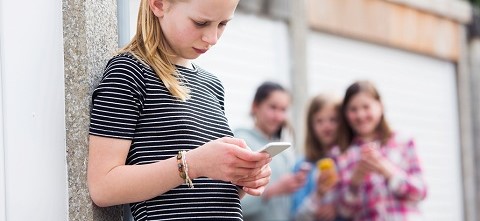[ad_1]
In January 2023, US Surgeon General Vivek Murthy, MD, released a statement that he believes children should be kept away from social media until at least 13, and preferably until 16. .
His reasons, he said, were that young people of this age are still developing their identities.
Social media often shows a distorted reality that can have negative effects on how young people develop a sense of self-worth, how they develop relationships, and how they view the world around them.
“I’m a proponent of keeping kids off cellphones until at least 13, and in fact, if possible, I would suggest until 16,” says Lisa Lowery, MDsection chief of adolescent medicine for Corewell Health’s Helen DeVos Children’s Hospital. “Parents need to be watchful and attentive to what their children are exposed to.
“I’m also a realist,” she says. “It can be difficult to keep our children away from social media. Research shows that staring at screens can also impact sleep quality and attention span; parents should keep cell phones, iPads and laptops out of their children’s bedrooms.
See life through a filter
With laptops and tablets in use during the days of the COVID pandemic, when many children had to go to school and take their lessons online, it can be complicated to have limits.
“I don’t recommend having cell phones at school because they’re a distraction,” Dr. Lowery said. “The use of cell phones and laptops can have positive aspects because of the ability to make connections. Social media allows students to virtually visit museums, see the world and promote advocacy. But overall, the harm outweighs the good for cell phone use.
Young people, she says, don’t always grasp the filters used on social media. They take what they see at face value.
“Social media is not reality,” Dr. Lowery said. “We use social media to showcase our best lives and lies. People only post the photos where they look the best or use filters. They only post about the good things in their lives. This can distort our perception of reality.
In some cases, Dr. Lowery warned, social media users go above and beyond choosing their best side in their posts. Some of these users present outright lies, such as predators, identity thieves, and others with dark intentions.
“Social media can perpetuate bullying,” Dr. Lowery said. “We see a lot of shame. A lot of body shaming, and it’s hard for young people. And then there’s sexting, that is, sending each other sexually explicit photos. Children do not understand that the Internet is eternal and that these photos can be shared.
Model intelligent online behavior
Dr Lowery suggests that parents, who may be as bad as their children when it comes to cell phone and social media use, be aware of their own behavior. If kids see adults glued to their phones for hours, they quickly get the message that it’s okay to do so.
“Looking at social media can be like falling down a rabbit hole,” she said. “It can be a good idea to set boundaries for all family members. No phones at the table. No screens two hours before bedtime. Buy alarm clocks instead of using our phones as bedside alarms. No phone when the family goes out to dinner together.
When it comes to reading e-books, Dr. Lowery noted that while online reading can be a positive activity, all the child sees is that we’re zoned out on our phones again.
“Make sure you communicate what you are doing. Although I love audiobooks and e-readers, I’m old school,” said Dr. Lowery. “I like leafing through a real book. And our children should see us reading.
When setting boundaries for our children, Dr. Lowery recommends starting with a frank conversation. Parents should have access to their children’s phones and all social media accounts – once they are old enough to have them – and all the sites their children access.
“They won’t be happy about it, but a parent should have all their passwords,” Dr. Lowery said.
A parent should also be one of their “friends” on any social media sites they use, she said.
“Have a conversation about the dangers of social media – talk about predators, explain that they should never share locations, phone numbers or any type of personal information online. Tell your kids to think about their grand- mom every time they post a message. If you would be embarrassed if your grandma saw the message, don’t post it.
Set limits
A growing body of research points to damage to brain development in young social media users.
A study published in JAMA Pediatrics in January 2023 shows a “dump of dopamine” in the brain every time the user accesses social media. The brain experiences a burst of this pleasure chemical that can alter brain chemistry over time.
In young children, the study indicates that habitual use of social media can lead to poor literacy skills and a reduced ability to use expressive language.
“To expect children to have the willpower to resist their phones and tablets is too much to ask,” Dr Lowery said. “That’s why parents need to set boundaries and practice good phone behavior themselves.”
[ad_2]
Source link
